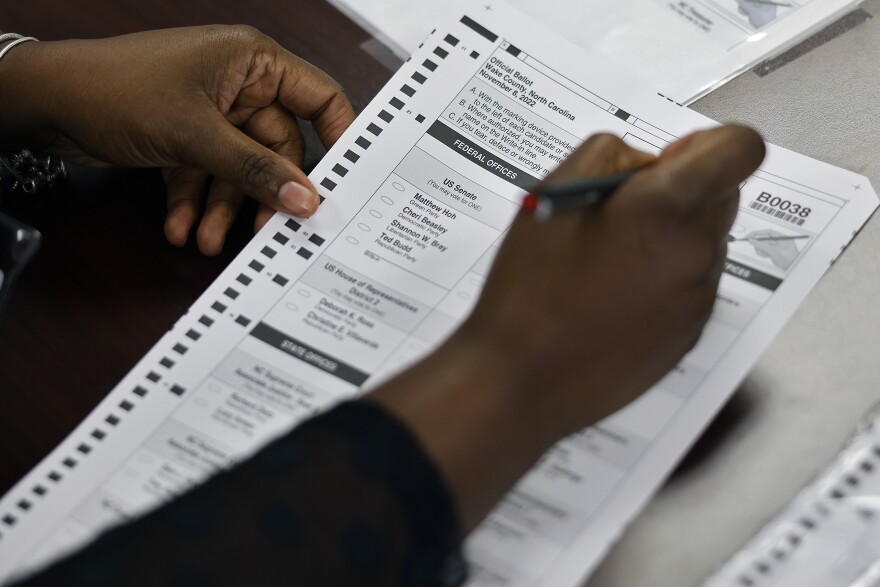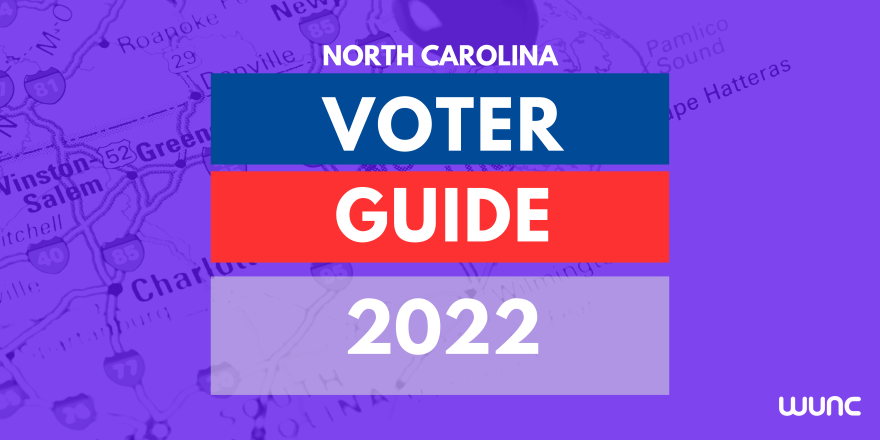WUNC has all the coverage you need this election season. Be sure to check out our Races To Watch stories for everything you need to know about candidates in statewide, congressional and legislative elections. Subscribe to WUNC's Politics Podcast and follow reporters Rusty Jacobs and Jeff Tiberii on Twitter. Early voting begins on Oct. 20.
North Carolina voters will make important decisions at the polls this year. Not only will they cast their ballots in a key U.S. Senate race, but they will also vote in races for the U.S. House, the state Supreme Court, and in NC General Assembly races that could tilt the balance of power.
Here’s everything you need to know about voting in North Carolina and Election Day 2022.
Before we get started, it’s important to remember that the North Carolina Board of Elections website has tons of resources and can answer most of your questions. We’ll link to them quite a bit here.
How do I register to vote?

So, you’ll want to head to this page on the North Carolina State Board of Elections website. Punch in your information and see if you’re registered to vote already. If you are, awesome.
If not, there’s a few options.
- Download this form, fill it out and send it in by mail.
- You can register to vote online through the North Carolina Division of Motor Vehicles if you have a state-issued driver’s license or DMV-issued I.D. You want to get this in before we’re 25 days out from the election, or it won’t be processed in time.
- Because of the National Voter Registration Act, there are several other state agencies you can also go through to register to vote. A list of those agencies can be found here.
What is the deadline for regular voter registration for the general election?
To reiterate, voters must be registered to vote 25 days before Election Day. So, this year, you need to be registered by Friday, Oct. 14.
Ok. What if I missed the deadline?
You can still register to vote, but you have to do it in-person at a one-stop early voting site. This is called same-day registration. Early voting begins on Oct. 20 and ends at 3 p.m. on Nov. 5.
You can find early voting sites here. Just select the county you live in, and a map will populate showing sites. There are eight early voting sites in Durham County this year, and 15 in Wake County.
In-person early-voting begins October 20 in NC. Find your county's one-stop early voting sites and schedules through the NCSBE's One-Stop Early Voting Site Search: https://t.co/AvDfGPcTwB#YourVoteCountsNC pic.twitter.com/6eIwaeUIGB
— NCSBE (@NCSBE) September 16, 2022
Wait, what is same-day registration? How does it work?
Folks choosing the same-day registration route must complete and sign a North Carolina Voter Registration Application and provide proof of residency by bringing one of the following:
- A North Carolina driver’s license.
- A photo I.D. issued by a government agency, as long as it shows the cardholders name and address.
- A copy of a current utility bill, bank statement, government check, paycheck or other government document showing the voter’s name and address.
- A current college photo I.D. card paired with proof of on-campus residency.
The county board of elections will review the registration of the voter within two business days. The vote will be counted unless the board determines that the voter was not qualified to vote.
One last note: if you do not have a photo I.D., you’ll need to provide your date of birth and social security number.

During early voting, can I vote on Sunday?
Perhaps. The North Carolina Board of Elections approved plans for 10 counties to open polls on Sundays for early voting. They are: Bladen, Brunswick, Chatham, Cumberland, Davidson, Lenoir, Lincoln, Martin, Nash, Pasquotank, Robeson, Surry and Union.
Am I eligible to vote in North Carolina? How do I know?
Here’s the boxes you need to check. You have to be:
- A U.S. citizen.
- 18 years or older by Election Day.
- A resident of North Carolina and the precinct you’re voting in for at least 30 days before Election Day.
What if I’m serving a felony sentence, or if I’m on probation or parole?
According to a recent ruling in July from the North Carolina Superior Court, if you are not currently in prison or jail for a felony conviction, you are eligible to register to vote.
This is a decision that has been appealed to the North Carolina Supreme Court, but as of Oct. 6, this ruling stands.
This means that folks serving on probation, parole or post-release supervision are able to vote in North Carolina.
One last note on this: Some voter registration forms in the state may not have updated language to account for this ruling. County board of elections have been instructed to accept outdated forms, as long as the person registering is eligible.
Eh. I don’t want to vote early. When is Election Day?
Election Day this year is Tuesday, Nov. 8. Polls are open from 6:30 a.m. to 7:30 p.m.
And a reminder: as long as you are in-line by 7:30 p.m., you will still be able to cast your ballot.
Polling places are typically busy in early mornings and late afternoons. For a quick and smooth process, try to shoot for the mid-morning or early afternoon.
Can I vote by mail?
Yes. Any registered voter in North Carolina can vote via an absentee ballot. No special need or circumstance is required.
Just remember: Your county board of elections must receive your ballot request form — completed and signed — by 5 p.m. on Nov. 1, a week before Election Day.
And how do I get an absentee ballot?
Click here to go to the N.C. Absentee Ballot Portal. This was first introduced amidst the pandemic in 2020, when many voters were voting by-mail for the first time.
You can also print out paper requests in English or Spanish.
Additionally, you can pick up an absentee form at your county’s board of elections office or contact them to mail you one.
Ballots started getting mailed out on Sept. 9.
Did You Know? As of Sept. 1, 2020, voters may request an absentee ballot online.
— NCSBE (@NCSBE) September 9, 2022
Request your ballot via the NC Absentee Ballot Portal: https://t.co/eIlsBmVyw0
#YourVoteCountsNC pic.twitter.com/p96wtbyWjC
Do I need a witness for my absentee ballot?
Yes. And you need two witnesses. In 2020, you only needed one.
However, if the signature is notarized, you only need one witness.
The notary — or two witnesses — only needs to see you mark your ballot, not how you vote.
Your witness has to be at least 18 years old and can’t be a candidate for an election.

What else is different from 2020?
If you fill out an absentee ballot, you cannot submit it online, or by email or fax. You have to mail-in your ballot, or deliver it in-person to your county elections office.
So, how do I send in that absentee ballot?
You can return your absentee ballot:
- By mail.
- By a commercial courier service, like FedEx or UPS.
- In-person at your county board of elections office.
- In-person at an early voting site in your county. Remember, these close on Nov. 5.
Also, if you are sending your absentee ballot back via USPS, you will need a 55-cent stamp. No elected official or advocate can pay for that, by the way.
Again, you cannot drop your ballot off at a polling place on Election Day. Take it to your local board of elections office by 5 p.m. If you are voting by mail, send it in sooner rather than later.
Will someone check my signature on my ballot?
No. The state board of elections has told county officials to not engage in signature matching when reviewing mail-in ballots.
On Oct. 3, Superior Court Judge Stephan Futrell rejected an appeal from the GOP that challenged a state board ruling prohibiting the practice.
Can I vote in person if my ballot was mailed to me?
If you changed your mind on voting by-mail, no problem. As long as you didn’t submit your absentee ballot, you can still vote in-person.
The North Carolina State Board of Elections says that your absentee ballot will be “spoiled” after you vote in-person. That means: if you already returned your absentee ballot, you cannot vote in-person. Again, you cannot vote twice.
So, how many people are expected to vote by mail this year?

Absentee-by-mail voting is off to a robust start for North Carolina's midterm elections.
Michael Bitzer — a professor in political science at Catawba College — says the number of North Carolina voters who've already cast mail-in ballots is 15 times ahead of where it was at this point in 2018.
"A little under 10,000 North Carolinians have already banked their ballot,” Bitzer told WUNC on Sept. 28.
Most – around 54% -- are registered Democrats. Bitzer says prior to 2020 it was Republicans who favored mail-in voting until Donald Trump sought to cast doubt on the process with baseless claims of rampant fraud.
"Republicans ditched voting by mail and went in-person,” Bitzer said.
Bitzer says total turnout could reach 60%. The 2018 midterms saw total turnout of around 53 percent of registered voters in North Carolina with no high-profile statewide race on the ballot.
How do I volunteer at a polling place?
The North Carolina State Board of Elections has a page on its website dedicated to volunteers and setting them up with polling places. Check that out here. Also, check with your county’s board of elections website, like this page that Wake County has.
I’m not sure where I should vote on Election Day. What should I do?
No problem. Click this link, plug-in your address and your polling place should pop up.
If I’m registered to vote, do I need to show my ID on Election Day?
No. A photo ID is not required to vote in North Carolina.
Even though state lawmakers approved a photo identification requirement nearly a decade ago – and voters backed an amendment to the state constitution as part of a ballot initiative during the last midterm – you still will not need a picture ID to vote this fall. That is because of multiple legal challenges.
What else should I know?
On the ballot in North Carolina this year is:
- A U.S. Senate seat
- 14 U.S. House seats
- Two seats on the state Supreme Court
- Hundreds of candidates seeking municipal and NC General Assembly offices
Tens of millions of dollars are likely to be spent on ads for TV, streaming, radio and mailers to get you to vote for, or against, particular candidates.
WUNC’s Rusty Jacobs, Jeff Tiberii and Sascha Cordner contributed to this report.
Correction: A previous version of this story incorrectly stated that North Carolinians were ineligible to vote if they were serving a felony sentence, or on probation or parole. We regret the error, and this story has been updated with correct information.







